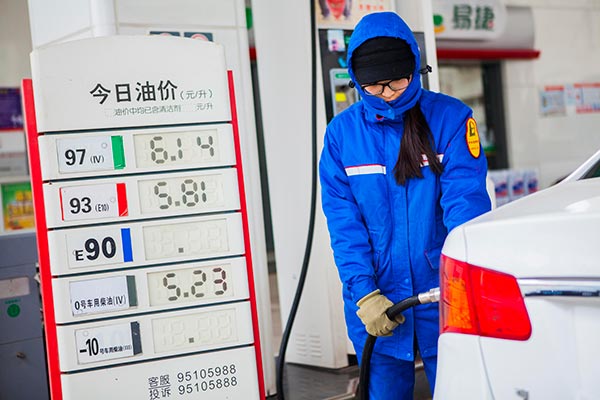Sinopec gets nod to buy 20% of Russia's Sibur
By Lyu Chang (China Daily) Updated: 2015-12-16 07:56
 |
|
An attendant fills a car at a gas station in Lianyungang, Jiangsu province.[Provided to China Daily] |
The takeover involves two stages-Sinopec will acquire 10 percent of Sibur for about $1.34 billion then buy the other 10 percent within the next three years, according to Russian media reports.
Shares in Sinopec declined 0.4 percent to 4.9 yuan (76 cents) on Tuesday on the Shanghai Stock Exchange.
The value of the second stage has not been disclosed due to the fluctuation in value of the company's shares in the next three years, it said.
Sinopec was not available for comment.
Analysts said that the total amount that Sinopec has agreed to pay is considered a little bit more than the real market value, because the valuation of the Russian company was estimated to be about $10 billion in 2014.
Other analysts said it is a good deal for Sinopec, especially at a time when many petrochemical companies are suffering heavy losses as a result of shrinking demand and a weak economy.
"It could be a good investment if you look at it in the long term," said Wang Qiang, a senior analyst at China Galaxy Securities Co.
"The valuation can't be very high, because the prices of crude oil and other large commodities are going down. So when the prices pick up, you will see profit returns."
He said Sibur covers a wide business scope in both the upstream and downstream sectors, making Sinopec a strategic investor.
The deal is a follow-up to the framework agreement signed in Beijing during Russian President Vladimir Putin's visit to China in September.
Wang Yupu, chairman of Sinopec, said earlier that the vertically integrated upstream and petrochemicals business model of Sibur is highly complementary with Sinopec's businesses.
"This transaction is in line with our objective to strategically expand our petrochemical business overseas.
"Our continued partnership will help diversify and secure Sinopec's long-term sourcing of petrochemical products," he said.
China and Russia have been accelerating cooperation in the energy sector as China needs natural gas supplies to feed its slower but still growing economy and energy-rich Russia faces financial challenges, experts said.
The two countries signed a 30-year contract for gas supplies to China in November through a western route, which followed a $400 billion deal that will deliver 38 billion cubic meters of gas to China annually through an eastern route, starting in 2018.
- Internet will continue to make a 'big' difference, says Pony Ma
- China Mobile aims to target 500m customers by end of next year
- IPO numbers and values soar in China as companies shun US bourses
- China to coordinate transcontinental trade initiatives with Russia
- Big cities in China luring talent despite drawbacks
- Alibaba, Disney team up for content services
- Chinese Internet companies investing overseas
- Global cooperation on cyber security issues needed

















